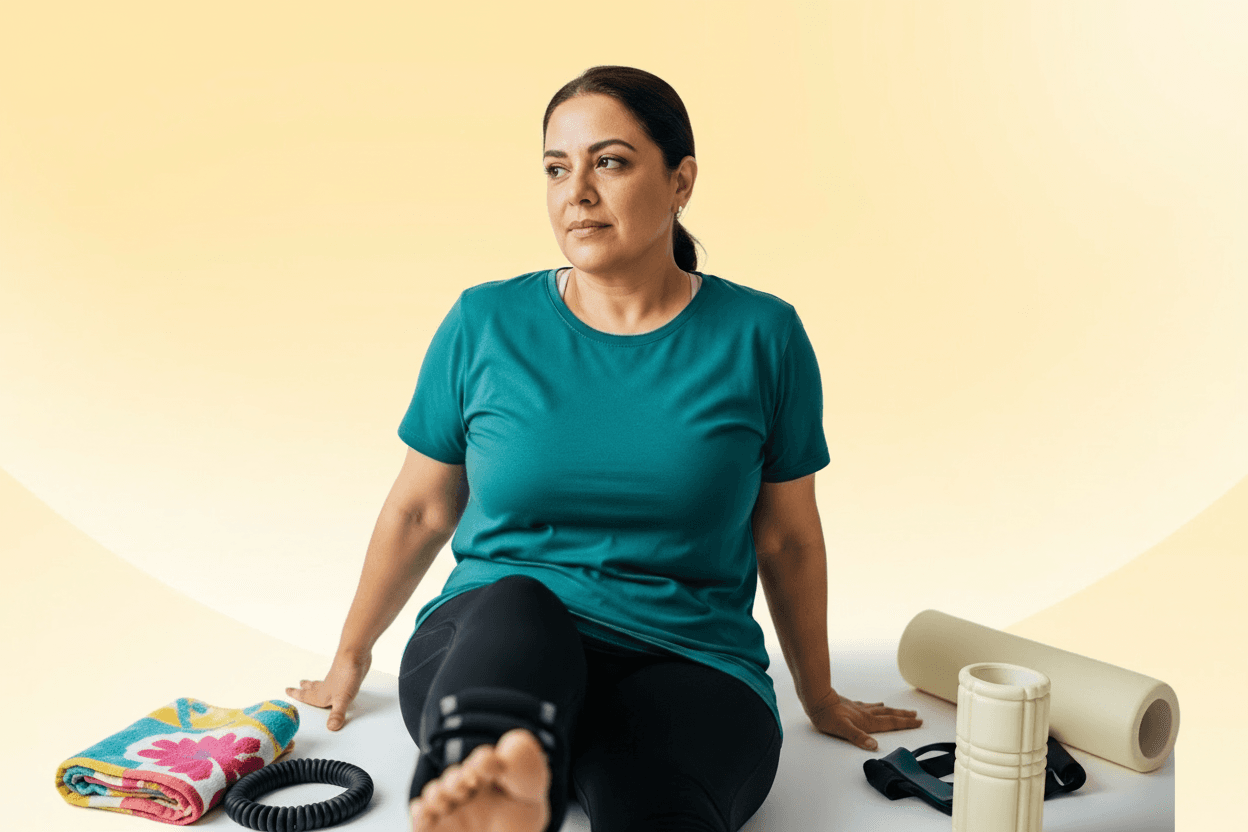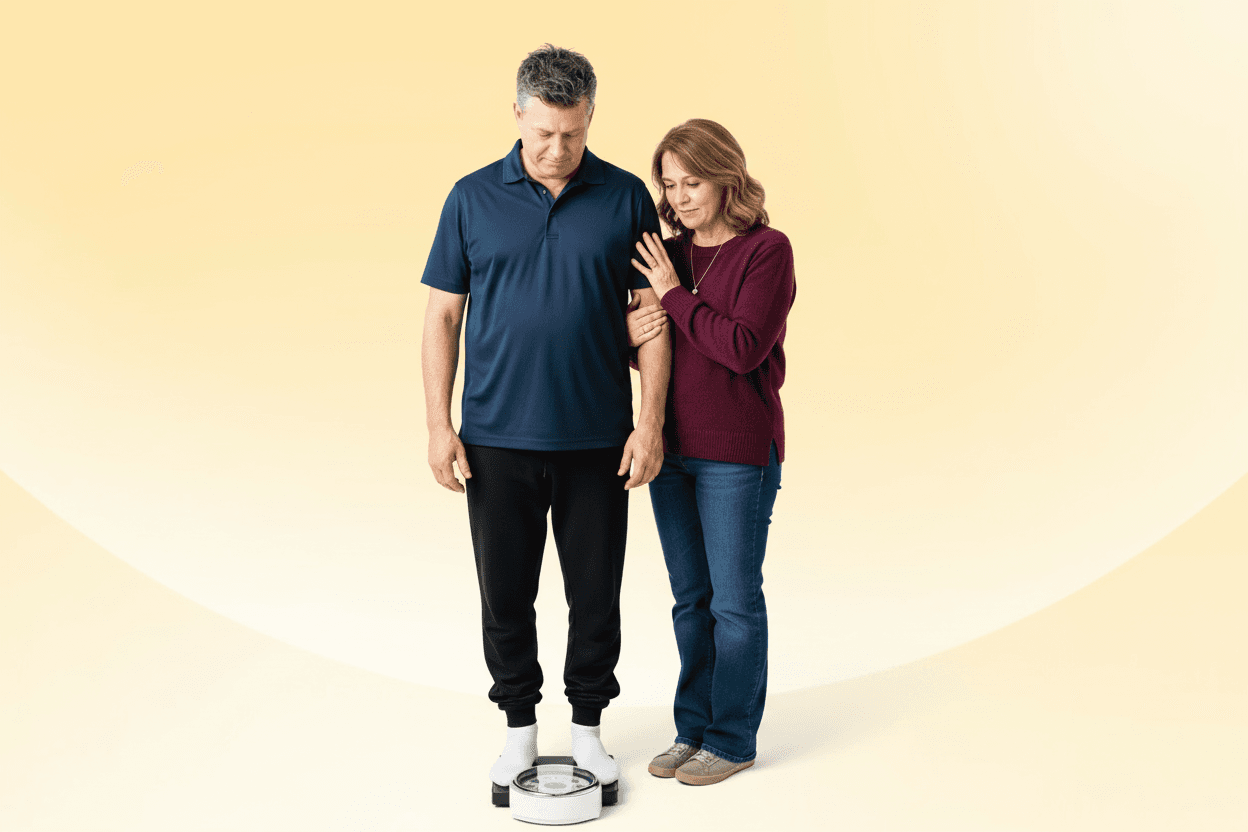Latest articles
Fresh healthcare insights

Low energy on GLP-1s: how to keep moving safely
Feeling tired on Ozempic or Wegovy is common. Learn how gentle, structured movement can protect muscle and support healthy weight loss.
December 19, 2025 • 6 min read

Strength training on Ozempic, Wegovy, and other GLP-1s
Strength training on GLP-1s doesn’t need to be intense. Learn what’s safe, effective, and enough to protect muscle and keep weight loss results lasting.
December 19, 2025 • 6 min read

Exercise on GLP-1s: how to stay strong while losing weight
Unsure how to exercise on Ozempic, Wegovy, or Mounjaro? Learn how simple, strength-focused movement helps protect muscle and keep weight loss sustainable.
December 19, 2025 • 5 min read

Ozempic vs Wegovy vs Mounjaro vs Zepbound muscle loss
Compare muscle loss on Ozempic, Wegovy, Mounjaro, and Zepbound. Learn why all GLP-1s come with muscle loss risk and how Sword Move helps you protect strength.
December 19, 2025 • 9 min read

Prevent tirzepatide muscle loss to lower GLP-1 and GIP spend
Tirzepatide drives weight loss but can reduce muscle. Learn how Sword Move preserves strength, reduces MSK risk, and supports lasting results.
December 19, 2025

How to prevent muscle loss on Mounjaro
Up to 39% of weight lost on Mounjaro is lean muscle mass. Learn how Sword Move helps Mounjaro users to protect muscle and sustain healthy weight loss.
December 12, 2025 • 7 min read

How to prevent muscle loss on Wegovy
Up to 39% of weight lost on GLP-1 medication like Wegovy is from lean muscle mass, not fat. Learn how Sword Move helps Wegovy users protect muscle and sustain healthy weight loss.
December 12, 2025 • 7 min read
For employers
Workplace health advice
How digital physical therapy improves employee retention
Did you know that fear of pain can be more disabling than pain itself? Chronic pain and employee turnover prevention are critically linked, but with the right MSK benefits coverage, employers can help their team members recover from pain to increase workplace productivity. Nearly 28% of people in the workplace will take leave for MSK pain over the course of a year. Patients who suffer the two most common conditions of low back and neck pain have an average return to work of 7 days. Overall, MSK conditions are responsible for 44 missed work days each year on average.
October 24, 2025 • 5 min read
How to evaluate and select the best digital MSK vendors
Musculoskeletal (MSK) disorders are one of the most expensive and under-addressed cost centers facing U.S. healthcare providers. MSK disorders affect 1 in 2 Americans and cost over $190 billion per year, more than heart disease, cancer, or mental health conditions. For employers and health plans, MSK claims are often among the top 3 cost drivers. And for members, chronic pain reduces quality of life, drives absenteeism, and often leads to costly downstream interventions. That’s why digital MSK solutions have surged in popularity. The promise is compelling: better access, which drives stronger engagement, delivers better outcomes, and therefore lowers overall healthcare costs.
October 24, 2025 • 6 min read
Reduce MSK costs with more effective digital MSK care plans
You’ve likely seen numerous digital health solutions that promise to lower medical spend. You’ve probably zeroed in on the top conditions with significant digital solutions in the marketplace: musculoskeletal (MSK), mental health, and diabetes. For most companies, prioritizing MSK care over other digital health solutions will drive the biggest benefits for your employees and your bottom line when it comes to savings. Given the multitude of vendors, platforms, and solutions available, prioritization can be a daunting task. How do you choose from among the thousands of digital health tools? What combination of condition focus and solution selection will drive the best outcomes for your population and the biggest return for your business?
October 24, 2025 • 5 min read
GLP-1 employer healthcare costs: lower spend with better outcomes
GLP-1 medications like Ozempic and Wegovy are transforming how employers approach obesity care. Once reserved for diabetes patients, these drugs are now widely prescribed for weight loss. GLP-1 drugs do deliver on their promise of improved cardiometabolic outcomes. Simply, these medications do help users lose weight. But for health plans and employers, the real challenge goes beyond pharmacy claims. The bigger risk is in the hidden costs that accumulate over time when GLP-1 treatment is not paired with sustainable lifestyle changes. Without movement programs to protect lean muscle and build healthy habits, employers may face a second wave of musculoskeletal (MSK) claims, re-prescriptions, and long-term disability costs. GLP-1 users often don’t develop the behaviour change needed to sustain weight loss over time. Also, lean muscle mass is often lost during GLP-1 use which leaves people at increased risk of musculoskeletal (MSK) issues as a result of lower strength and stability levels.
October 23, 2025 • 8 min read
Expert guidance
From the experts: Ask a physical therapist

Ask a PT: when is the best time to do my exercises?
Before I joined Sword Health, I worked in brick-and-mortar clinics. I never worked weekends, and rarely worked past 6 pm. My schedule was great...for me. But for my patients, it was a real challenge. Attending a physical therapy appointment might require leaving work early or slipping out at lunch. Even patients with more flexible schedules would sometimes lament about finding childcare or arranging transportation. A thirty-minute appointment could easily take an hour or even 90 minutes once travel was taken into account. When I was in a clinic, the “best” time for a patient to do their exercises was the time that worked for me, not for them. Sword's virtual model gives our members the power to do their exercises when AND where it's most convenient for them. Now that I work remotely for Sword, I’m able to help our members figure out the best time to do their exercises at home. Now, when my members ask me when they should do their exercises, I tell them - the best time is when you’ll actually do them!
February 11, 2021 • 6 min read

Ask a PT: Does walking really help with pain?
If you’ve ever stood on the sidelines of a sporting event, you’ve likely witnessed many falls, trips and tackles. Whether the players are small children or professional athletes, the advice from the coach may have simply been to “walk it off.” While that is not always the best solution after an acute injury, walking can be a really effective way to manage chronic pain. Motion is lotion. Movement increases blood flow, which brings nutrients to our tissues. It also helps those that don’t have blood flow, like cartilage. Cartilage lines our joints, absorbing impact. It’s surrounded by a liquid which provides it with nutrients, flowing in and out of it like a sponge. Exercise, like walking, causes loading that fills and squeezes that sponge, particularly in the joints of our legs and spine.
August 13, 2020 • 4 min read

Ask a PT: What Is Causing My Shoulder Pain?
When your shoulder hurts, it can be difficult to tell exactly what’s gone wrong. You’ve probably heard of pinched nerves and rotator cuff tears. Perhaps you’ve also heard about shoulders being ‘impinged’ or ‘frozen.’ It’s not easy to keep these various shoulder conditions straight, especially when they all cause similar pain symptoms. The first step towards fixing a problem is identifying it. This article, written by a team of Doctors of Physical Therapy, is designed to help you figure out what’s causing your shoulder pain — so you can begin the process of healing it. We will dive into the five most common causes of shoulder pain and how to differentiate them. Cervical refers to the neck, and radiculopathy is pain that radiates to another body part. Hence, cervical radiculopathy: a pinched nerve in the neck, which can cause radiating pain affecting the shoulder. It occurs when the cervical spine becomes damaged due to sudden injury or degeneration over time, and squeezes or puts pressure on a nearby nerve.
November 1, 2023 • 6 min read
Healthcare contributors
Meet Sword's expert authors

Vijay Yanamadala
Chief Medical Officer at Sword Health

Fernando Correia
SVP Clinical & Regulatory Affairs at Sword Health

Megan Hill
Director, Clinical Specialists

Morgan Hollis
Head of Clinical Strategy, Sword Move

Jennesa Atherton
Head of Clinical Affairs, Sword Bloom

Liz Santo
Senior Clinical Program Manager, Sword Bloom ·







